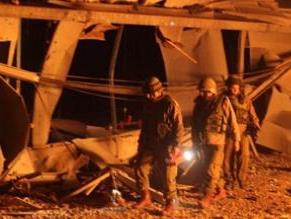|
World Jewish News

Damage caused by Katyusha rockets, northern Israel, Nov 29, 2011.(Photo by Yaron Kaminsky, Haaretz.com)
|
UNIFIL vows to ensure calm after four rockets strike Israel from Lebanon
29.11.2011, Israel and the World The United Nations International Force in Lebanon vowed Tuesday morning to ensure that the border remain calm, hours after four Katyusha rockets were fired into Israel.
UNIFIL commanders held emergency meetings with representatives of the Israel Defense Forces and the Lebanese Army following the overnight attack.
UNIFIL released a statement declaring that it had deployed extra troops and patrols in the area to preserve the calm and would do everything possible to make sure restraint was exercised.
"This is a serious incident in violation of UN Security Council resolution 1701 and is clearly directed at undermining stability in the area," UNIFIL said in its statement.
Several rockets fired from Lebanon hit the Western Galilee overnight, the first since 2009, prompting Israel to return artillery fire, military officials said.
Two buildings in the Western Galilee were damaged and one of the 22-millimeter rockets struck a gas tank. The rockets ignited a blaze that firefighters fought for hours. No casualties were reported.
Residents said they heard two explosions and that houses shook.
Israel said it was trying to establish who fired the rockets from Lebanon, but that it held the Lebanese government responsible and would deliver a complaint.
"The Lebanese government is responsible for everything that happens in Lebanon and everything that exits from its border," Home Front Defense Minister Matan Vilnai said.
No organization has yet to take responsibility for the rocket fire. The IDF does not believe that Hezbollah was responsible for the rockets, but rather a smaller faction.
In Lebanon, security sources said the four Katyusha rockets were fired into Israel from an area between the villages of Aita Shaab and Rmeish, about 2 kilometers from the border.
They said Israel fired four artillery shells in response, but they landed in fields and caused no damage.
An IDF spokesman said the rockets were the first fired since 2009 across a border where a 34-day war was fought in 2006 between Israel and Iranian-backed Lebanese Hezbollah guerrillas.
"Several rockets hit the western Galilee. The Israeli army considers the incident severe and is targeting origins of fire," said a statement from the military spokesman's office.
The chairman of the Galilee town that absorbed the attack said residents were going about their daily routine, despite the rocket fire. He said that while the attack came as a surprise, it was not completely unexpected considering ongoing tensions in the area.
"It's true that it is relatively quiet here, but there have been incidents of rocket attacks in the last five years," he said. "We're just lucky that it was chicken coops that were hit, and not houses."
Israel's defense establishment should carefully weigh its options following the rocket fire, said the town chairman, adding that "perhaps the time has come to consider deploying a rocket detection system in the north of the country similar to the [Iron Dome batteries] in the South."
By Reuters, Jack Khoury and Eli Ashkenazi
Haaretz.com
|
|
